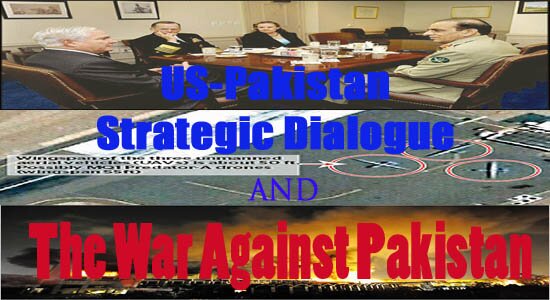
 Print This Post
Print This Post  Email This Post
Email This Post
President Obama’s endorsement did more than offer verbal support to India’s longstanding ambition for a seat at the big table. It confirmed that Washington is now embarked on a strategy to prop up India as a counterweight to China’s growing political and economic power.
DR. MALEEHA LODHI | Tuesday | 16 November 2010 | The News International
WWW.PAKNATIONALISTS.COM
ISLAMABAD, Pakistan—Hours before Barack Obama’s address to the Indian parliament last week the American ambassador in Islamabad informed the Foreign Ministry that his president was about to announce US support for India’s permanent membership of the UN Security Council (SC). No indication was given to Pakistan earlier that a move with such far-reaching strategic implications was in the offing.
Not during the much touted Pakistan-US ’strategic dialogue’ held two weeks earlier in Washington. And not in lengthy exchanges during the subsequent visit to Islamabad by Douglas Lute, special assistant to President Obama.
In contention is not whether Islamabad could have influenced a decision that was America’s to make but that Washington could do so with little concern about the consequences for its relations with Pakistan.
Pakistan’s predictably strong reaction to the announcement reflected the depth of its opposition to a move that will seriously upset the regional balance of power. Resolutions adopted by both the cabinet and parliament conveyed Pakistan’s protest and said the move disregarded Pakistan’s principled position and sensitivities on UNSC reform.
President Obama’s endorsement did more than offer verbal support to India’s longstanding ambition for a seat at the big table. It confirmed that Washington is now embarked on a strategy to prop up India as a counterweight to China’s growing political and economic power. The nature of Obama’s Asia tour – to India, Indonesia, South Korea and Japan – and recent policy pronouncements, such as its offer to “mediate” ocean-border disputes in South East Asia (while refusing to help resolve Kashmir) and on the currency dispute with Beijing, are all signs of a more overt policy to contain China.
To draw India closer behind Washington’s objectives Obama handed Delhi virtually everything it wanted from his visit: recognition of its global leadership, easing of controls on high-tech exports, endorsement of its role in Afghanistan and backing for India’s membership of four multilateral export control regimes.
Obama maintained silence on Kashmir other than anodyne statements about the need for India and Pakistan to resolve their differences. His support for a step-by-step process to first tackle the ‘easy’ issues endorsed the Indian approach to the dialogue. He lectured about human rights in Myanmar but couldn’t bring himself to utter a word about abuses in Kashmir, where half a million Indian security forces continue to ruthlessly suppress an uprising of stone throwing youth demanding ‘Azadi’ [freedom].
The strategic prize for India was Obama’s support for permanent membership of the SC which topped Delhi’s wish list. The principle that enlargement of the primary global security forum was not something to be unilaterally decided among select powers but based on an international consensus did not weigh on Obama’s mind.
This is at sharp odds with Pakistan’s position that SC reform should ensure fair representation for all 192 UN member states – large, medium-sized and small – and be determined by consensus to enjoy international legitimacy. It has opposed claims by some big powers for privileged positions, contrary to the UN’s central principle of the sovereign equality of states. Pakistan has also advocated representation of the 57 member Organisation of Islamic Conference in any SC expansion.
The gridlock on reform in the UN’s intergovernmental negotiations means that change will not come quickly or easily. But it will be a grievous mistake to conclude that Pakistan has little reason to worry about the US endorsement. President Obama’s pronouncement marks a major policy shift by Washington which had so far only declared support for Japan’s permanent membership. India will now seek to leverage this by mobilising the Group of Four (Germany, Brazil and Japan or a broader coalition) to secure the endorsement of the UN General Assembly (GA), probably well before its next session.
The view that Islamabad should not react to what some describe as a “symbolic” US move overlooks the recent history of reform efforts at the UN. It is instructive to recall what happened in 2005. In March that year the UN secretary general called for an early decision on UNSC reform. This spurred India along with the other G4 countries to mount what was described as one of the biggest lobbying exercises in UN history.
Sensing a momentum for reform the G4 tabled a ‘framework’ resolution in July 2005. This called for four new permanent seats for themselves, two for Africa and another four non-permanent seats. The resolution was co-sponsored by 23 countries in the GA, which has to approve by third-thirds any proposal to amend the UN Charter. This must then be accepted by all five permanent members of the SC.
Calculating that adding veto-wielding members would be opposed by the P5 the resolution left this issue for the new permanent members to decide.
Opposing this were nations grouped in the Uniting for Consensus (UFC) led by Pakistan and Italy and supported by Mexico, South Korea and Argentina among around 35 countries. The UFC’s alternate proposal rejected new permanent seats and instead called for increasing non-permanent members to twenty-four, elected on a regional basis.
The G4 sought support from the 53 member African Union in order to secure the required two-thirds. But their efforts foundered when an African Summit declined to endorse their position. Algeria and Egypt successfully insisted that the longstanding African position – demanding two permanent seats with veto powers to be selected by the African nations – ought to be reflected in the G4 resolution. G4 expectations that South Africa and Nigeria would deliver the Africans failed to materialize.
This led to the collapse of the G4 effort. Not being able to count on the votes of the African group, the G4 was obliged to withdraw their resolution. Even with the 80 or so votes that G4 nations claimed to have mustered, without significant support from Africa, they could not achieve a two-thirds majority.
Since then negotiations in UNGA’s inter-governmental group have swirled around rival reform proposals pressed by the G4, UFC and other countries.
After President Obama’s declaration, the G4 along with Brazil and South Africa will try to renew their offensive to change the dynamic at the UN. This presents Pakistan with a major diplomatic challenge. Islamabad and other UFC countries will have to anticipate a diplomatic battle on multiple fronts.
Having rightly taken a robust position at the outset Pakistan will have to focus diplomatic efforts on four important tracks. One, Islamabad will need to translate its strong position into coordinated demarches in the capitals of GA member states.
Two, and most critically it will need to coordinate closely with China to ensure that Beijing reverts to its 2005 position of vocal and active opposition to the move for enforced adoption of a G4 type resolution. Islamabad will have to convince Beijing that it avoids sending any ambiguous signal that could be exploited by the G4 and its allies to rally support and switch the position of those backing the UFC or the undecided. A ‘red signal’ now will avoid China being placed in a difficult even untenable position later where it might have to use its veto alone to thwart the adoption of a UN Charter amendment approved by the General Assembly.
Three, Pakistan, together with the UFC countries, will have to launch an energetic campaign to galvanize support behind their own reform proposal and secure the 70 or so votes to block the G4 or similar resolution. OIC countries, ignored in the G4 plan, will also have to be persuaded to throw their weight behind this campaign.
And four, Pakistan will have to forcefully convey to Washington that it should not translate its verbal support for India into active lobbying to help it gain permanent membership. Such a demarche in Washington should signal that Pakistan-US relations would be adversely affected if the Administration goes beyond declaratory statements.
These efforts will have to rest on the firm premise that there is nothing inevitable about SC reform dictated by the self interest of some countries. This will mean disregarding defeatist voices at home who believe that, after American endorsement, India’s permanent membership of the SC is inevitable. It is not.
Ambassador Lodhi served as Pakistan’s envoy to Washington. The article is adapted from an op-ed by the author in The News.
© 2007-2010. All rights reserved. PakNationalists.com
Verbatim copying and distribution of this entire article is permitted in any medium
without royalty provided this notice is preserved.







Leave a Reply